The Death of Liberal Democracy and What Comes Next — Part 1
The Autopsy: Cause of Death—Form Over Mission; Procedure Over Principle
Part 2 Is available Here:
It. Is. Dead. Liberal democracy has died.
Not the first principles that make self-government worth having, but the operating system that claimed to protect them: a process-first framework that mistook manners for mission and procedure for principle. It taught citizens to equate legality with legitimacy while teaching power how to use law as a weapon. The result is not a mystery—it’s the world we’re in: polite forms fronting anti-democratic ends, institutions that flinch at signals from above, and a politics that praises “the right way” even when the project is to end self-government.
This series isn’t a catalog of outrages; it’s a blueprint. Part 1 performs the autopsy: how form laundered substance, procedure laundered power, and retaliation became policy. Next, we’ll show why a system built around outcomes (freedom, equality, pluralism) invited failure, and make the case for first principles that precede those outcomes—truth, fairness, merit, responsibility, simplicity. From there, we’ll replace the reflex of “did it follow process?” with the harder test: does it honor the principles? Finally, we’ll translate those principles into a principles-first, defensive democracy—an operating system that can defend itself and judge legitimacy by alignment with values, not by ritual compliance with form.
This is an exercise in asking the right questions and resolving where we go from here. By the time we are done you’ll agree: the right question isn’t whether we can resuscitate the body of liberal democracy before us. We can’t—and we shouldn’t try. Rather, if the first principles of self-government are to survive, we have to accept that this version of “liberal democracy” is over and choose between two paths:
Birth a principled, defensive democracy—state first principles up front and equip the system to defend them; make process a tool that answers to values, not a substitute for them.
Submit to American fascism—eliminationism cloaked in paperwork, rule by force, and the normalized punishment of opposition.
This is not a call to meet violence with violence. It’s a refusal to bless our own disarmament. What follows shows how the old creed failed—and begins the work of replacing it with a democracy that knows the difference between means-and-ends—and acts accordingly.
The Autopsy
Now, the autopsy—how “liberal democracy” died.
Two notes up front:
In what follows, Ezra Klein serves as shorthand for a liberal reflex that confuses form for substance. This is a critique of a mindset, not of one person.
I’m not doing stenography—the receipts for the events that follow are everywhere. What matters here is how these well-documented episodes thread the same path toward consolidation, not the footnotes of any one of them.
Form laundering substance
After Kirk’s shooting, Klein wrote a column in which he declared, unequivocally, that Kirk “was practicing politics the right way.” Days later, he warned against giving “the lost or the mad a veto,” while closing with the credo that “we are going to have to live here with one another… friends and foes at the same time.”
The problem: this treats method as the measure of legitimacy while bracketing mission. It assumes the conflict is hot tempers or lone gunmen—problems that “normal politics” can salve—rather than acknowledging a faction that has mastered the use of procedure to seek the end of democracy—whether you’re looking at Citizens United, the gutting of the Voting Rights Acts, or Charlie Kirk’s debates; a faction that openly advances theocratic and eliminationist goals. In that world, “doing politics the right way” (debate tours, Supreme Court arguments, campus Q&As, polite tone) becomes a moral laundering machine.
This is the primary cause of death for liberal democracy: it tolerated those who sought its annihilation so long as the would-be annihilators politely followed the rules as they sought to end democracy.
Big picture: we must not oblige ourselves to “live with” a program that aims to abolish our basic order simply because it travels under the banner of debate. Form doesn’t cleanse substance; procedure isn’t legitimacy. The moment a movement chooses the end of democracy as its stated goal—implicitly or explicitly—is the moment democracy must say—unequivocally: there is no mode, no “right way,” by which that project can coexist inside a free polity. It doesn’t matter whether they try to get there by kumbaya debates or by bullets—the ideology itself has no claim to platform, no claim to legitimation. They’re welcome to advocate that dream somewhere else; it is incompatible with ours, outside the bounds of democratic accommodation. This is not a call to repel them with violence, but to repel them by denying the opportunity to legitimacy.
Procedure as a weapon
Even Klein now concedes—in conversation with Kate Shaw, former clerk to SCOTUS Justice Stevens—what Shaw spells out: a sixteen-case streak in which the Supreme Court sided with Trump via the shadow docket, even as liberals touted wins in the lower courts that were later neutralized at the top. The message to power was simple: outrun review; SCOTUS will catch you when it matters.
Death by a thousand cuts:
Heller/McDonald (2008/2010): a sweeping re-interpretation of the Second Amendment after decades to the contrary—exactly the kind of special-interest triumph Chief Justice Warren Burger once called—almost 30 years before the rulings as a warning— “one of the greatest pieces of fraud on the American public.”
Citizens United (2010): money as speech at a scale that drowns speech—structural tilt toward captured politics.
Shelby County (2013): Voting Rights Act gutted, with predictable disenfranchisement following.
Trump v. United States (2024):
Timing: the Court slow-walked the case, ensuring no pre-election reckoning for the attempt to steal the 2020 election or for the attempted insurrection to revert its result.
Substance: it placed core presidential powers beyond criminal law—absolute immunity for “core” acts, presumptive immunity for other official acts, and limits on using them as evidence.
Secondary cause of death of “liberal democracy”: treating legal as democratic by definition. If “it cleared procedure” equals legitimacy, then procedure becomes the perfect laundering machine. A system that confuses the two trains citizens to accept anti-democratic outcomes so long as they arrive stamped and docketed.
History’s warning is simple: regimes can encase atrocity in law. Nazi Germany’s camps were “legal.” Gas chambers were “legal.” Slavery was “legal” right here, according to our own Constitution, for over a hundred years. The problem was never the presence of law; it was the absence of principle beneath it. When a democracy stops anchoring law to first principles, “legality” becomes a costume anything can wear—including fascism.
Big picture: A judge’s stamp doesn’t make a power grab self-government. Legal ≠ democratic. The more we pretend otherwise, the more we volunteer to be ruled by timing games, paperwork, and opinions that arrive just in time to certify what power already did.
Unmasking MAGA
Further reading — Unmasking MAGA
If you really want to understand how we got here, "Umasking MAGA" shows why it was inevitable: decades of choices—on both sides—built a process-first system that was always destined to be weaponized and used to destroy itself.
Retaliation as the program
If you launder form and weaponize procedure, this is where you end up.
Speech → punishment. First came Colbert’s cancellation. Then at the time, Trump himself said Kimmel was next. Now, after Jimmy Kimmel mocked the politicization of Kirk’s killing; within 48 hours affiliates preempted, the FCC chair waved the license/ “public interest” stick, and ABC pulled the show, with Jimmy Fallon and Seth Meyers in the crosshairs. This is retaliation in a suit—intimidation framed as process so everyone can pretend nothing happened or get over it quickly.
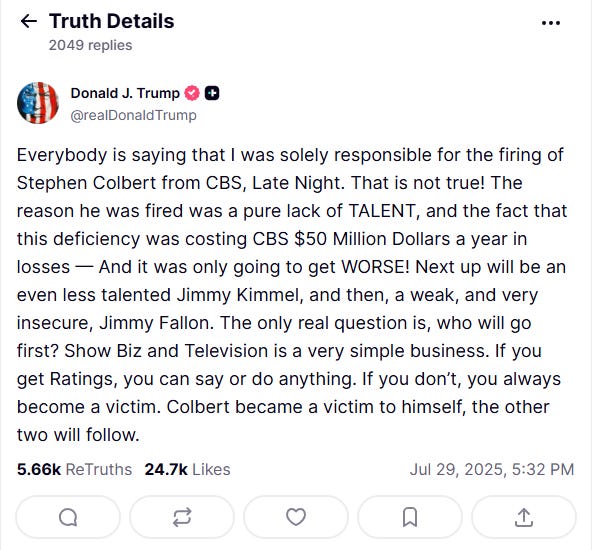
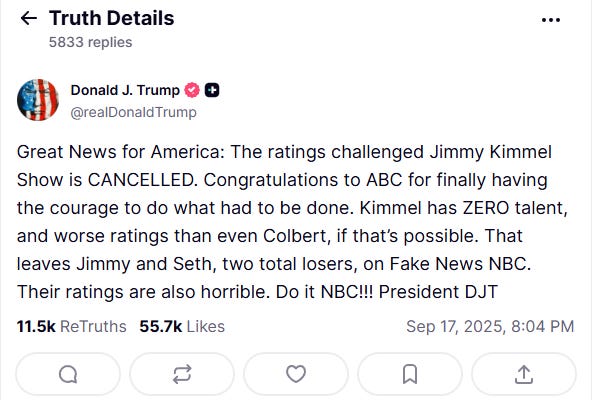
TruthSocial Posts from Donald Trump directly attacking free speech Punish the opposition, criminalize the defense. “Retribution” becomes governing doctrine. The White House talks about designating “anti-fascism”—not an organization but the idea of opposing authoritarianism—as a terrorist organization, with talk of “investigating funders.” That isn’t crime control; it’s an attempt to outlaw the defense of democracy by decree.
Force as domestic politics. Charlie Kirk openly pitched military “occupation” of blue cities. Posts wish for a “dictator,” promise to lock up and silence political enemies, and sermonize about an internal “ideology” that must be defeated and dismantled. The target is political opponents; the method is state power; the goal is domination.
Institutional follow-through. Affiliates and networks preempt or pull programs after regulator hints; employers use blacklists and firings for lawful speech; “brand safety,” “public interest,” and “investigations” supply the paperwork of punishment. The full attack on the left as an evil ideology that is threat to the American way of life:
This is the terminal event—the heart attack: everything above—form laundering substance and procedure as a weapon—was the untreated disease. Retaliatory politics is the outcome: it disqualifies opposition, relabels the defense of democracy as extremism, and invites force as arbiter, all actions that were espoused and called for by Kirk. But the truth is: no amount of process makes that democratic. There is no “right way” to seek the end of democracy, contrary to what liberals like Klein claim.
Big picture: before us lies the deceased body of liberal democracy, beaten and violated for decades until all that is left is the unrecognized carcass we’re experiencing today. We can keep pretending the rituals are working, or we can accept reality and choose:
Birth a principled, defensive democracy—first principles up front (truth, fairness, merit, responsibility, simplicity), process as a tool that answers to them, and real defenses for those principles.
Submit to American fascism—eliminationism cloaked in paperwork, rule by force, and the normalized punishment of opposition.
If you’ve made it this far, you know what’s at stake. The American Manifesto isn’t just analysis—it’s our shield, our rallying cry, and our weapon against the lie now being used to dehumanize us. Every subscription amplifies the truth, spreads our reach, and builds the wall of resistance we need to withstand what’s coming.
We cannot be silent. We cannot be scattered. We cannot afford to be ignored.
Subscribe. Share. Stand. The fight depends on it.
In Part 2, we’ll lay out why a system built around outcomes (freedom, equality, pluralism) and a process-first reflex was always destined to fail, and we’ll define the first principles that must precede those outcomes and drive process: truth, fairness, merit, responsibility, simplicity.
Your move — tell me where you stand
I want to hear from you in the comments:
Do you agree with the autopsy? If not, what’s the strongest counterargument?
Is “liberal democracy” (as process-first framework) dead? If you think it can be revived, what would that take—and why would it work now?
Which example here convinced you—or changed nothing? Point to what mattered and why.
Which first principles belong at our core? If you’d add or cut from truth, fairness, merit, responsibility, simplicity, let me know why.
Where is your red line? At what point should a movement be disqualified from institutional legitimacy, no matter how politely it proceeds?
What did I miss? Do you see things completely differently? Tell me more!
Keep it focused. No calls for violence—ever. We’re building something that can defend a free society without becoming its enemy.
Comment. Share. Bring one reader with you.
Part 2 drops next: Principles Before Process and Outcomes.
Read Part 2 Next ↓




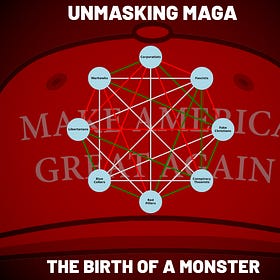

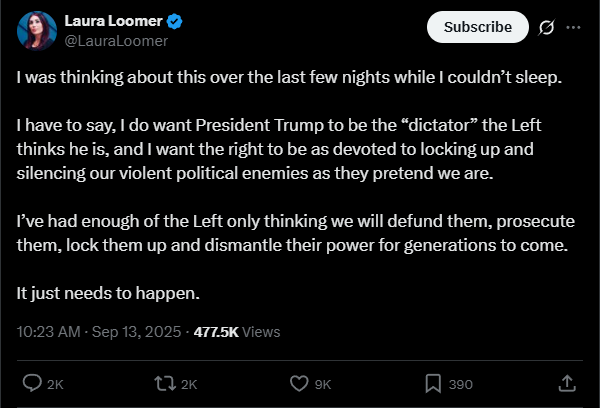
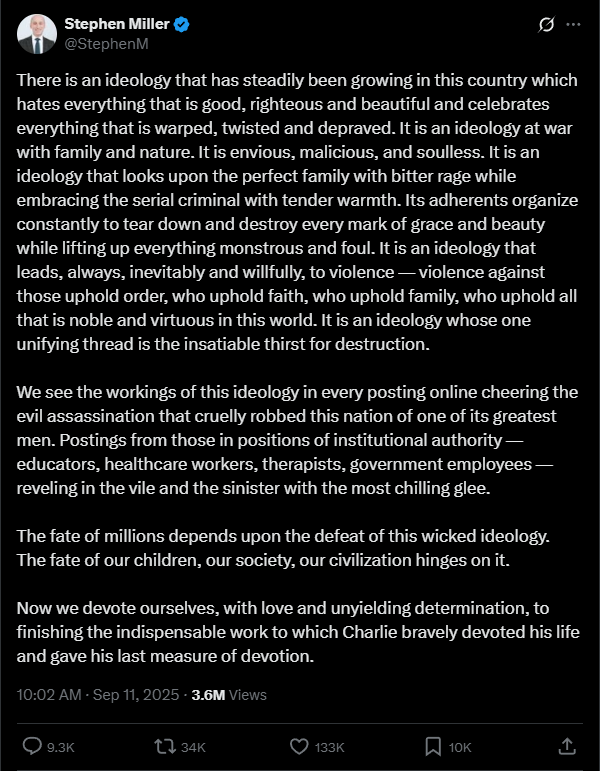
Cheeto And Destruction Of The Middle Class
Cheeto and his Nazi allies know that WE the People will carry the day So one of the prominent overarching Nazi strategies is to weaken the middle class
What does that look like? Primarily it’s the inflation game If you make it hard for the average American to make a living, the pressure becomes overwhelming and damaging Instead of 1 job, one needs to take on 2 or 3 jobs to make ends meet No time for vacations, no time for time off, just bruising through with no end in sight This leads to an electorate that can’t pay attention to what’s happening politically and is so stressed due to inflation that voting becomes secondary or unimportant at all
This is why Cheeto is pushing all the country’s wealth away from the middle class and to the top 10% of the electorate which will reward him with support in political campaigns And this is why Cheeto wants to emphatically lower interest rates because this will cause inflation to go even higher
Inflation is the name of the game for Cheeto because it will create a politically disabled middle class and create a wealthy dominant oligarchic ruling class
I have been thinking about one particular question asked in this article, that is, "What is your red line?" My red line was crossed when tRump was elected the first time. That election destroyed my faith in the idea that people thoroughly reflect and vote on true principle and conviction, learning that people are shallow and complacent, and that my idea of America was completely incorrect.
The shallowness and complacency, I believe, arose from years and years of being fed the "trickle down effect" and this "Captitalistic Society" in general, that seems rooted in more is better, and money, power, and having it all, at any cost, it is devoid of morals, principles, truth, and real justice.
In forming a new version of democracy, it would include, for me, a hard and, fast line in the sand when it comes to "White Christian Nationalism," it would include not allowing any talk that debases, devalues, and otherwise tries to make one less than, based on culture, breed, creed, color, language, sex, or gender. A "new democracy" must clearly be rooted in true justice for all, and it must be secular. Religion has no place in the creation and foundation of a new democracy.
We must fully embrace the idea that everyone is equal, differences are good, and this provides for robust discussion and deliberation of policies that govern society. We must all agree to let scientific good data, truth, and civil discourse lead and determine policies that benefit all.
I suppose I would be called a socialist because the policies that Bernie, AOC, and Mamdani espouse are policies that benefit all. Water should not be monetized, environments should not be destroyed in the name of $$ and greed. I see having clean drinking water, a healthy environment, fair pay, free and good health care for all, real reproductive healthcare that is not influenced by politics and culture wars but rooted in science, free and good education, and housing for all, are in my mind, human rights.
The same playing field for all, a societal contract that one must subscribe to wholly for the betterment of all, one created based on science, data, a benefit to all, and it came from real civil discourse and debate.
I am over capitalism, greed, culture wars, racism, and the hate espewed incessantly aimed a dividing a people who really have much more in common than not. I am tired of this regime trying to make everyone afraid, and fearful differences, and everything, and everyone. I want my 23-year-old son to have more than this disgust that is swallowing up this nation if we fail to act by utilizing our power as the people, who this country belongs to. Take breaks to power up again but, this is it, we had better get in this game now before it is too late.